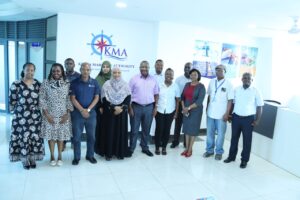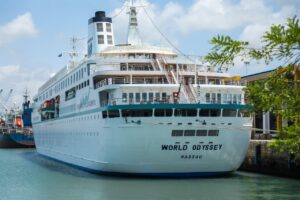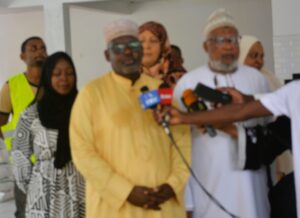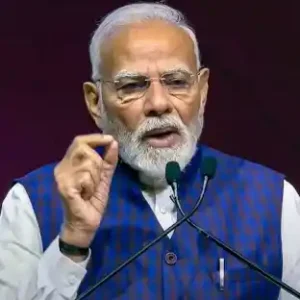Kenya and Germany Chart a New Maritime Frontier Through Strategic Port Diplomacy

President William Ruto and German Chancellor Olaf Scholz. (Photo/ Courtesy)
By Andrew Mwangura
Email, thecoastnewspaper@gmail.com
Kenya’s maritime sector this week stepped further into the global spotlight as Kenya Ports Authority managing director Captain William Ruto hosted a high-level German delegation led by Alexander Fierley, the Deputy Head of Mission at the German Embassy in Nairobi.
The talks, held at the Port of Mombasa, reflected far more than a routine diplomatic courtesy call; they were a clear signal that Kenya’s ports are increasingly viewed as strategic gateways capable of shaping the economic future of an entire region.
As global trade routes shift and competition among ports intensifies, engagements such as these underscore the importance of building resilient partnerships grounded in shared economic interests and long-term vision.
For Germany, one of Europe’s largest economies and among the world’s leading trading nations, exploring opportunities along the East African coast is both rational and timely.
German industries rely heavily on predictable, efficient supply chains, and their interest in Kenya comes at a moment when global shipping networks have been disrupted by climate pressures, geopolitical tensions, and cost escalations that demand smarter, more reliable logistics hubs.
Fierley’s remarks made this clear: the delegation’s mission is to conduct a regional marketing assessment, one that identifies opportunities for collaboration but also examines how Kenya can strengthen its role in global trade flows.
The visit to Mombasa, and later to Lamu Port, reflects an understanding that East Africa’s logistics architecture is undergoing a quiet but profound transformation — and Germany wants to be part of shaping it.
At the center of these discussions was the Port of Mombasa, a facility whose evolution over the past decade has been marked by ambitious expansion, modernization, and digitalization.

It is here that Kenya has demonstrated the ability to grow capacity while simultaneously improving efficiency, all while navigating the demands of a rapidly expanding regional market.
From berth upgrades to yard expansions and cargo-handling automation, the port has become increasingly competitive, enabling the Northern Corridor to remain the lifeline for land-linked states such as Uganda, Rwanda, Burundi, South Sudan, and parts of eastern Democratic Republic of Congo.
As investment continues to flow — most notably through public–private partnerships and bilateral cooperation — Kenya’s position as the region’s maritime anchor becomes even more secure.
Captain Ruto’s call for deeper collaboration in infrastructure development and trade investment, including in the Special Economic Zone, therefore sits within a larger strategic context.
The SEZ concept is central to Kenya’s ambition of transforming its port cities from mere transit points into full-scale industrial and logistics ecosystems.
By attracting manufacturers, assemblers, agro-processors, and value-addition industries, the SEZ at Dongo Kundu has the potential to shift the narrative from exporting raw goods to producing higher-value products within Kenya’s borders.
For German investors, whose industries are synonymous with precision manufacturing, renewable energy solutions, and advanced engineering, the SEZ represents a platform with immense potential for mutually beneficial cooperation.
But it is not only the physical infrastructure that matters. What gives Kenya an edge — and what partners like Germany keenly observe — is the country’s commitment to aligning port operations with global standards.
Whether through digitized cargo clearance systems, harmonization of corridor procedures, or integrated customs processes across partner states, Kenya has demonstrated a willingness to embrace efficiency as a competitive tool.
In an era where time is currency and delays translate into direct financial losses, this shift is critical. Fierley’s acknowledgment of engagements with Northern Corridor officials points to the recognition that a port is only as strong as the transport network feeding into it.
Thus, the conversation naturally extends beyond quayside operations to roads, rail, pipeline networks, and regulatory harmonization — all areas where Kenya and Germany have a history of cooperation.
Indeed, the relationship between the two nations is not new. Germany has long supported Kenya through major development banks, technical cooperation programs, and capacity-building initiatives in fields ranging from renewable energy to vocational training. The maritime and logistics sectors therefore represent a natural extension of this relationship.
What is changing, however, is the scale and strategic nature of the engagement. With Africa now viewed as the next frontier of industrialization and trade expansion, Germany’s presence in Kenya’s port transformation agenda signals a recognition that East Africa is not just a market but a strategic partner.
Captain Ruto was emphatic in reaffirming KPA’s commitment to supporting investors and promoting a predictable trade environment.
Such assurances matter, especially in a global economy marked by uncertainty. They also mirror Kenya’s stated ambition of becoming a premier logistics hub, not just by virtue of geography but through deliberate policy, investment, and diplomacy.
The meeting with the German delegation thus represents more than a bilateral discussion; it is a reminder that Kenya’s ports are emerging nodes in a global network where efficiency, innovation, and international cooperation define competitiveness.
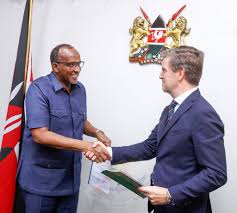
As Kenya continues to invest in port expansion, maritime capacity, and logistics modernization, partnerships like the one explored this week with Germany offer more than funding or technical input — they offer confidence.
Confidence that Kenya’s ports are ready to compete globally. Confidence that the region’s economic engine is accelerating. And confidence that strategic diplomacy, anchored in clear development priorities, remains one of Kenya’s strongest tools in shaping its economic destiny.
The author is a policy analyst specializing in maritime governance and blue economy development.

